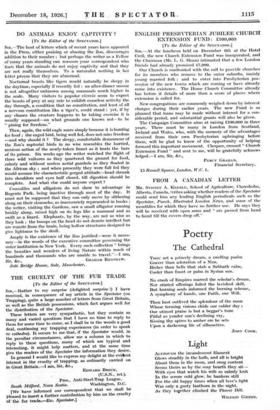DO ANIMALS ENJOY CAPTIVITY ?
[To the Editor of the SPECTATOR.] SIR,—The host of letters which of recent years have appeared in the Press, either praising or abusing the Zoo, discourages addition to their number ; but perhaps the writer as a Fellow of many years standing can reassure your correspondent who fears that the animals do not enjoy captivity and that they are not really themselves. To a naturalist nothing in her letter proves- that they are abnormal.
Nocturnal beasts like tigers would naturally he sleepy in the daytime, especially if recently fed : an after-dinner snooze is not altogether unknown among mammals much higher in the scale. Many visitors to popular vivaria seem to expect the beasts of prey at any rate to exhibit ceaseless activity the day through, a condition that no constitution, and least of all a nervous constitution like a tiger's, could stand : yet, if by any chance the creature happens to be taking exercise it is usually supposed—on what grounds one knows not—to be " pining for freedom."
Then, again, the wild eagle soars simply because it is hunting for food ; the caged bird, being well fed, does not miss freedom —and why should it ? The sleepy, comfortable demeanour of the Zoo's raptorial birds in no wise resembles the hurried, anxious action of the newly-taken linnet as it beats the bars of its prison. Six weeks ago the writer watched the flight of three wild vultures as they quartered the ground for food, calmly and without useless aerial gambols as they floated in the African sky ; and when presently they were full fed they would assume the characteristic gorged attitude—head shrunk into shoulders and eyes half closed, till digestion should be complete. And what else could anyone expect ?
Crocodiles and alligators do not show to advantage in Regents Park, being inactive through most of the day. It
must not be supposed that they can only move slithering along on their stomachs, as inaccurately represented in books ; the writer, visiting the. Gardens, saw a small alligator running briskly along, raised high on its legs like a .mammal and as swift as a lizard. Elephants, by the, way, are not so wise as they look ; the bumps on the head do not denote intellect but are remote from the brain, being hollow structures designed to give lightness to the skull.
Amply is the .existence of the Zoo justified—were it neces- sary—in the words of the executive committee governing the sister institution in New York. Every such collection " brings the beauties and wonders of living Nature within reach of hundreds and thousands who are unable to travel."—I am, Sir, &c., GRAHAM RENSHAW. Sale Bridge House, Sale, Manchester.










































 Previous page
Previous page